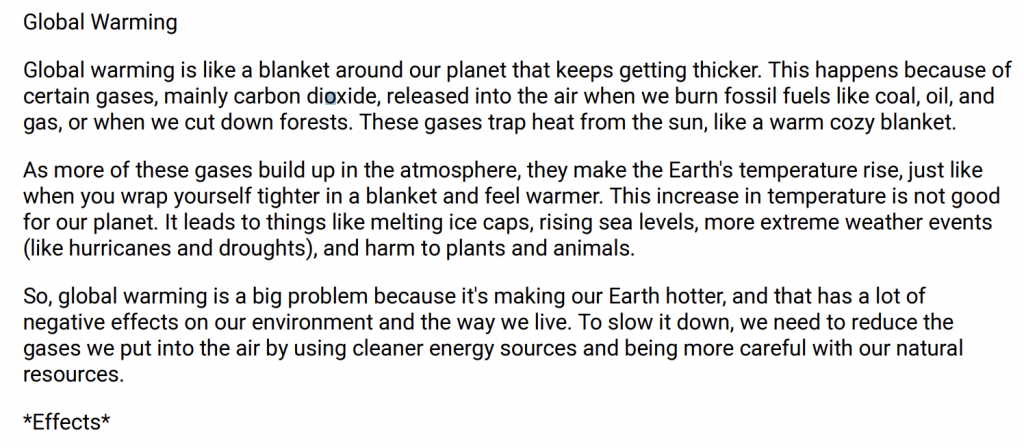Mitigating Global Warming
Summary:
The document comprehensively overviews global warming, its effects, and potential solutions. Global warming is primarily caused by the accumulation of greenhouse gases like carbon dioxide, which trap heat in the Earth’s atmosphere. This leads to various detrimental effects, including rising temperatures, melting ice caps, and extreme weather events like hurricanes and droughts. These changes have far-reaching impacts on ecosystems, human health, and the economy.
The consequences of global warming are multifaceted. Rising temperatures lead to heatwaves, affecting both people and wildlife. Melting glaciers contribute to rising sea levels, causing coastal erosion and flooding. Extreme weather events can devastate communities and ecosystems. The document also highlights the issue of ocean acidification, which harms marine life. It discusses the health impacts of higher temperatures, such as heat-related illnesses and the spread of insect-related diseases. Additionally, global warming affects food and water availability and has economic repercussions, including damage to infrastructure and increased healthcare costs.
The document suggests a collective effort involving individuals, communities, governments, and industries to combat global warming. Key solutions include reducing greenhouse gas emissions through energy-efficient appliances and transitioning to renewable energy sources like solar and wind power. Other strategies involve conserving energy, preserving forests, and promoting sustainable agriculture. The document also emphasizes supporting green technology and advocating for government action, such as international agreements to limit emissions.
Excerpt:
Mitigating Global Warming
Global warming is like a blanket around our planet that keeps getting thicker. This happens because certain gases, mainly carbon dioxide, are released into the air when we burn fossil fuels like coal, oil, and gas or cut down forests. These gases trap heat from the sun, like a warm cozy blanket.
As more of these gases build up in the atmosphere, the Earth’s temperature rises, just like when you wrap yourself tighter in a blanket and feel warmer. This increase in temperature is not good for our planet. It leads to things like melting ice caps, rising sea levels, more extreme weather events (like hurricanes and droughts), and harm to plants and animals.


Reviews